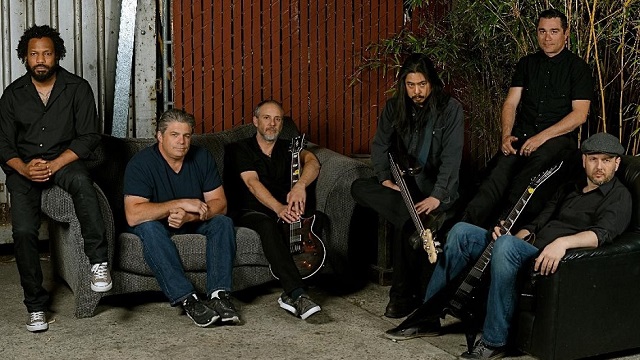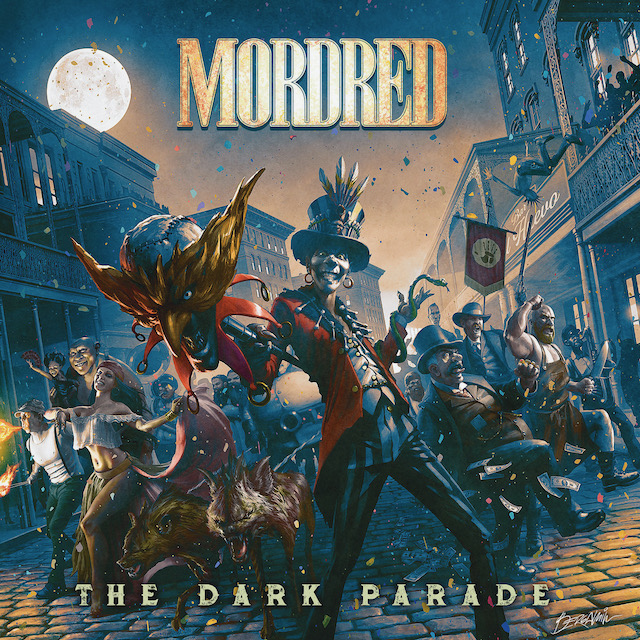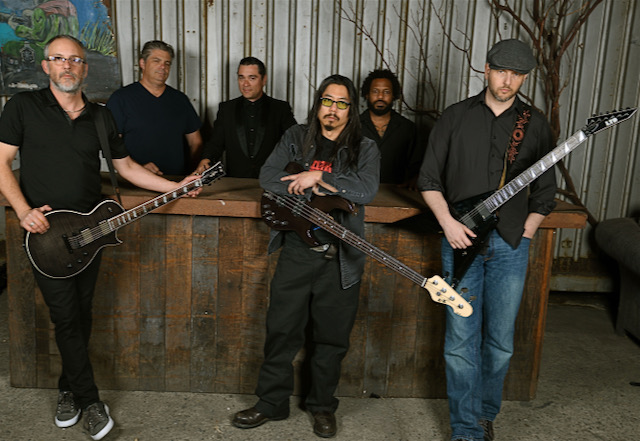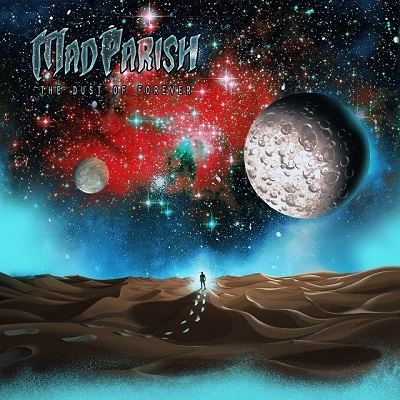MORDRED’s DANNY WHITE On First Album In 27 Years, Acting The Fool, And Navigating The Bay Area Metal Scene
August 3, 2021, 3 years ago

All good things come to those who wait. For those long suffering fans of Bay Area funk thrashers Mordred, the payoff is one nearly three decades in the making.
Mordred dropped their first studio album in 27 years The Dark Parade in late July through M-Theory Audio, their first since 1994’s The Next Room and follow up to 2020’s EP Volition.
Danny White, longtime Mordred guitarist and celebrated music instructor, caught up with Brave Words for a deep dive into the Mordred reunion and long-awaited studio return, navigating the Bay Area metal scene, the pros and cons of their thrash funk sound, adapting to the COVID-19 pandemic in style and much more!
BraveWords: It’s been nearly 30 years since Mordred’s last studio record, eight years since the band reunited in 2013. Obviously the COVID-19 pandemic has impacted the way artists have tackled releases and promotions. All told, what’s your take on the lengthy gap between albums?
Danny White: “I mean, it's been a long time coming and there's been a lot of stuff going on before and after we got back. It took us a long time. I was busy, the other guys in the band were busy. Life intervenes, you know? Families, careers, just social obligations in general. It just took us a while to get it together, basically.”
BraveWords: You’re living in California now, but you’re a New Yorker born and bred if I’m not mistaken?
Danny White: “Yeah, we're in the Bay Area. I was living in New York, living and working on Park Avenue like the same job that I have now, teaching music … Before that I was an audio engineer for a long time, also in that neighborhood as well, like two blocks away.
My family is from New York and I was born and raised there. I got to California when I was just starting high school.”

BraveWords: You mention the teaching element. That must provide such a different outlet and artist satisfaction compared to writing and performing.
Danny White: “It is. It also depends on what you're teaching and when. I mean, as the music teacher for this school, I was teaching everything from theory to different instruments, to songwriting. So when you're teaching songwriting, you're writing songs. So I never really stopped writing songs. But yes, there's a different feeling that comes from teaching. I'm lucky enough to be a music teacher, like I'm not a math teacher or anything like that. It’s a little harder sometimes to get excitement from a student. Like I'm an elective. If you want to learn music, you choose me. I didn't choose you. So they're pretty much motivated from the get go. And it's fun, but it's music. I get to see them get all excited and figure out what they want. It's a very student centered approach at the school. So I'm like, what do you want to do? Well, I want to learn guitar. Alright, here, let's do it. Do you want to write a song? Yeah. OK, let's do it.”
BraveWords: Have you had a situation pop up where you have students who are aware of Mordred and your history with metal? Any potential shredders in the making?
Danny White: “Some kids blow me away and they actually kind of know what my band has done. Most of them don't know what the hell Mordred is or where it came from or what's going on. And I'm happy to tell them about it if they're interested. A lot of times they're just doing their thing. When you're that age, you kind of only want to know, does this person have what I need and is it going to be fun? That's pretty much the only requirement for teaching music in my opinion.”
BraveWords: Going back to your move to the west coast and the Bay Area, were you aware as a young man that there was something happening with the rise in metal, and particularly the Bay Area thrash scene?
Danny White: “I think it was kind of specific for me. I mean, I did go to high school in the Bay Area, went to San Francisco to McAteer, a public high school. The Twin Peaks area was at the top of the hill. I went to school and we were into all the early stuff like Boston and heavy stuff like Black Sabbath's first record, lots of Zeppelin. I didn't get into the New Wave of British heavy metal, really, until like my last year of high school and started to kind of get little inklings of things like Angel Witch and Raven and obviously Motorhead, Budgie, Riot. There was Judas Priest, obviously, and Iron Maiden. High school was rife with that type of stuff. And it was just a ton of fun to be hanging with your friends, going to parties and playing music. I was in a band called High Voltage and we played Boston covers, and that was the first band I was in. We did some Zeppelin stuff and a couple of other things, AC/DC. And then there was Savage Angel that came after that and we did original music and it sounded kind of like a cross between Raven and Angel Witch and a little Maiden in there too.
“I wanted to be a guitar player, I wanted to be in a band the whole time I was in high school. I had a couple of bands and the last band, Savage Angel, we were doing stuff, but we just weren't doing enough for me. So I went down to Los Angeles after high school, went down to the Musicians Institute and I’m down there for like eight, 10 months, something like that and have a great time because we just play music all day long. Paul Gilbert was in my class, trading licks with Steve Trovato and Scott Henderson. Tommy Tedesco was down there, who's like this legendary session player. So I was in heaven. I was in guitar player heaven when I was down there. Practicing six, seven, eight hours a day for. There was this long hallway in the Musicians Institute and we'd be in these rooms, like a shotgun hallway with rooms. And they let you smoke back then. So all the guitar players open their doors, you smoke and your guitar cord was just long enough to let you go out in the hallway. You're trading licks with the guy down the hall.
“I was down there for a bunch of months. I got a call from this dude named Sven Soderlund, who is kind of a legend in the Bay Area heavy metal community. And he was like dude, you’ve got to hear what's going on up here. And I had no idea. George Lynch from Dokken and Warren Demartini from Ratt, all the L.A. guitar players, I didn't like the music so much or the songs, but loved the guitar players. I just loved the solos. I was fastforwarding to the part of the song where the solo was picking up, but in terms of like the music itself it wasn't really my favorite thing. I got into Steve Vai while I was down there. But anyway he's like, you need to hear what's going on up here. And he sent me Metallica and let me listen to No Life ‘til Leather, and then told me about a bunch of stuff that was going on there and it literally kind of blew my mind. I never heard anything like it before. That level of aggression, that level of heaviness and just raw energy. And I was hooked. Instantaneously, I was like this is cool. He's like, come on up, we'll start a band and we'll take advantage of this thing that's going on. Already at that time there was Exodus. I think Death Angel had just come on and they were like kids. They were like little really, all related and just young and talented. It was crazy.
“I came back up after I graduated, like a month later. Had this idea of a band called Mercenary, so we brought in Slade Andersen and Brooks Holland and it was Sven Soderlund and me. My grandfather had just passed and left me a bunch of money, so I used the money to make a demo … And it came out pretty good. It was our contribution to that time. You know, we were running around in different San Francisco clubs. The Stone and the Kabuki Theater, all just legendary places to play. When we could we made it over to the East Bay and went to Ruthie's, all the other places and that whole area when we could because it was across the bay bridge. But yeah, it was a special time. It was a special place and I knew it then and I was happy to be a part of it. But looking back on it as like this historic kind of time, era and place, it's just become that much more of a reality, I guess, to me as I get older.”
BraveWords: Describe to me the idea to incorporate funk and, I suppose, hip hop type elements in Mordred. Was it a conscious decision to help have you stand apart from the crowded field of thrash bands in the area? Or was it more influence based?
Danny White: “I mean, it was an organic but conscious decision I think both at the same time, because we were going out and we were seeing those types of bands, like heavy funk bands, for lack of a better term. That word has become such a hot word for thrash music that it's still weird saying it. Either you fall into the thrash only camp where you can't have anything in your thrash soup and just need thrash. It's just like no, no, no, I don't like the flavor, don't like it. Then there's the guy next to him that's like, you know what? I can have a little bit of that and those extra styles sprinkled in there. I like a little bit of variety in my thrash soup. And then the guy next to him is just like, just bring it on, whatever the heck you want to put in the thing! As long as it sounds good, as long as it's a good song. Because I write songs, I try to write good songs. I don't try to write genres. We listen to all this different music, we listen to these heavy funk bands that were city bands. They were city bands, we were a city band ... We became friends as we went out to all of these clubs and saw all of these bands play. The thrash bands would play and then these other bands would play and we'd just listen to it all. We just soaked all of it up. And so that became like our writing. It just became what we went to see.”

BraveWords: Do you think incorporating those elements like funk hurt you when it came to being able to perform and play with thrash or heavier bands? It must have been a double-edged sword in a way.
Danny White: “Yeah, we had this hard and fast, heavy thrash scene that was exploding here, and we played with all of those guys. We played with Exodus, we played with Megadeth and played with Legacy before they were Testament, we played with Death Angel. We played with everybody. Locally for the city gigs it was a little bit more depending on who you talk to. Some people were more open to it than others. In Europe it was a little different. It was a little bit more accepted. It's funny because I felt like we got a little bit more accepted when we flew over. We had these shows and people were kind of like what the fuck is it? They didn't know what to make of it and in a good way, like we were different. We weren't everything else that was coming out of that. So we had some really good shows where we came over. And it was the same type of questions that we get now.”
BraveWords: All these years later and Mordred reunites in 2013. Why was that the appropriate time?
Danny White: “I mean, they asked me a couple of times before 2013 and I was just busy. I just couldn't do it. I'm an audio engineer and I was working and I just didn't have a lot of time. As an engineer you'd be up against deadlines. You could be up for two or three days sometimes doing mixes for some company or cable channels ... But 2013 rolled around and it was after the 2008 recession. I had gone back to school to get my teaching degree to get like a backstop, a little bit of a plan B. My plan B became kind of like my plan A. I was teaching and I had some extra time and I had a studio. My job affords me something like a recording studio. That time when Scott called me, he's like, let's do a record. And we talked about it and it made sense. We talked about the direction that we wanted to take it in. We wanted to keep things heavy, but still just do Mordred. We set out to kind of do this like combination feel loosely around the first and second record. And I wrote ‘I Am Charlie’, I think it was the first tune. And then there were a couple of other tunes that didn't make the cut because it was not really hard enough for what we were talking about and what we were kind of going for. But after that it started to kind of slowly come together.”
BraveWords: Here on the other side of the release, how are you and the guys feeling with the reception of the record from critics and fans? Anytime there’s that big of a gap between albums there’s bound to be heavy expectations.
Danny White: “I feel pretty great … We'd been letting singles out and it's just kind of been getting progressively better. For the most part the reviews have been very good. And I think we've been kind of welcomed back by people and, by and large, people have taken to Mordred now. For any artist that's great and for any musician your latest work is the stuff you're most excited about. So luckily we must be doing something right. Luck is preparation plus timing.”
BraveWords: Obviously the pandemic has impacted the entire music business for the past 18 months. No one can predict the idea of releasing a record during a pandemic, much less a return after 25-plus years. How did you navigate that?
Danny White: “Well, we had a record ready when the pandemic hit. We played the last show at The Cornerstone before they closed down. We were ready. We had a bunch of shows lined up. We were playing with young bands, Violent Legacy and a bunch of like these younger thrash bands. We were waiting till the record came out and we were going to tour off of it, but all of a sudden we were shut in and we had to make do with what we had.”
BraveWords: The band seemed to adapt tremendously well given the circumstances. Your video series Acting The Fool became a quick fan favourite. Take me through the idea to keep the momentum going for the record with that outside the box idea.
Danny White: “One of the guys, I think it was Wayne Marsala, a friend of a friend Scott knew, wanted to do a documentary style thing on Mordred. He wanted to come in to record like us at the mixing board. They were talking, him and Scott and Scott was telling him about this online idea that we had and Wayne was like you guys should do a variety show. It was his idea actually, like let's make it a little more interesting, put a bunch of stuff together and make it like a variety show. So Scott and Jeff kind of ran with it and they did most of it. I did stuff that they kind of just told me to do. They would hire the comedian, the host, the burlesque dancer and write all these skits. Wayne came in with his crew and filmed the whole thing. And then we got Death Angel's mixer to come in and mix the whole thing. So it became kind of professionally done. We had another friend of ours, Chris Powell, who is like the unofficial seventh member of Mordred kind of, and he also had ideas for shooting for skits and whatnot. So it became like almost a Saturday Night Live type of coalition of ideas and friends getting together and keeping busy, basically. Keeping busy while this pandemic is raging and on fire through the musical industry, because we didn't have a choice man. We had to do what we could with what we had. And it was fun. It was great. It gave us a reason to get out of the house.”











